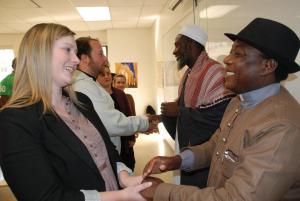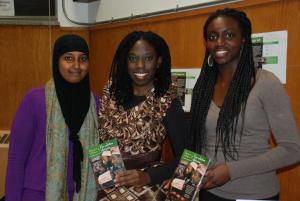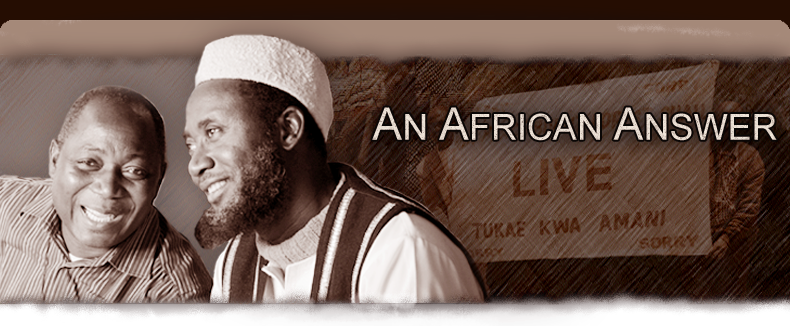Lord, make me an instrument of your peace.
Where there is hatred, let me sow love.
Where there is injury, pardon.
Where there is doubt, faith.
Where there is despair, hope.
Where there is darkness, light.
Where there is sadness, joy.
Prayer of St. Francis
Theirs is not a rags-to-riches saga or even a tale of a steep ascent from obscurity to power and glory. Yet when Imam Mohammed Ashafa and Pastor James Wuye speak, Heads of State, Heads of Mission and other world leaders listen in respectful silence. Sometimes they even sign peace accords after hearing their words of wisdom.
Ashafa and Wuye, two remarkable Nigerians who were once locked in mortal combat as militia leaders on opposite sides of the Muslim-Christian divide in their own country are now firm friends committed to sowing seeds of love and peace in places where hatred and violence once reigned supreme.
 Canadians of many diverse backgrounds had a rare opportunity to meet them and hear them in person at a panel discussion on 1 November at St Paul University, Ottawa. The audience included diplomats and parliamentarians as well as other Canadians of various cultural backgrounds.
Canadians of many diverse backgrounds had a rare opportunity to meet them and hear them in person at a panel discussion on 1 November at St Paul University, Ottawa. The audience included diplomats and parliamentarians as well as other Canadians of various cultural backgrounds.
With the two Nigerian visitors were two other men who also played important roles in their peace mission. One was Alan Channer, the British director of The Imam and the Pastor and An African Answer, two award-winning documentaries that captured their riveting story and facilitated their transformation from local village heroes in Nigeria to unofficial international ambassadors of peace. The other was Joseph Karanaja, a Kenyan lawyer, whose peace activism in his own troubled land led him to appeal to Ashafa and Wuye to bring their healing hands to his country.
Moderated by Vern Redekop, Associate Professor of Conflict Studies at St Paul University, the panel discussion was preceded by excerpts from The Imam and the Pastor and An African Answer, with updating footage that had not been shown before.
'My peace be on all of you,' said Pastor Wuye as he began his presentation, setting the tone for the whole evening. He went on to summarize the amazing story of his own personal journey from feelings of hatred towards Ashafa’s co-religionists who had killed his people and caused him to lose a hand in battle, to a gradual build-up of mutual trust and respect and a desire for peaceful co-existence. Emphasizing that it was a slow and difficult process, he gave full credit to his Muslim colleague for taking the initiative and offering support and sympathy when his mother took ill and died.
Wuye also acknowledged the role of FLT Films, Channer’s documentary production company, and of Initiatives of Change in making their story known to the entire world. 'When the Imam and I started our Peace Centre in Kaduna, Nigeria, we never thought it would go global,' he said.
His thoughts were echoed by His Excellency, Professor Iyorwuese Hagher, High Commissioner of Nigeria to Canada who acknowledged the duo as Nigeria’s peace ambassadors to the world.
'Today, humanity is in danger and though religion is part of the problem, it can be part of the solution too,' affirmed Imam Ashafa. 'Our story is from the heartbeat of the African continent,' he continued. 'This is a civil society initiative of Nigeria. It’s a human story, a story of our nation and our continent, and our desire to get it right.'
Commenting on the role of the mainstream media Ashafa noted that it is more interested in 'breaking' than 'breakthrough' news. Thus stories like this often go unnoticed in the world.
Speaking of the duo’s role in Kenya, he said: 'Cultural sensitivity is important in peacemaking. I came as a brother, not with sympathy but with empathy.'
Karanja said that this kind of initiative starts with an individual. He promised that he would put his own legal career on hold during Kenya’s next election in 2012 to devote himself to peacemaking activities and to preventing a repetition of the shocking violence that occurred in 2009.
Channer stated that it took a big team, with input from the people of Nigeria and Kenya to produce the films. In response to a question on how he chose to tell this particular story, he said that he had been looking to make a film about reconciliation between Christians and Muslims. A rabbi had prophetically told him that such a story might come from a totally unexpected part of the world.
A question and answer session followed the panellists’ presentations, with many in the audience offering their own insights and posing thoughtful questions.
 The audience was also introduced to a 'Peace and Reconciliation' multi-media package for the use of those engaged in conflict resolution. It consists of DVD of the two films and a resource guide for grass root practitioners.
The audience was also introduced to a 'Peace and Reconciliation' multi-media package for the use of those engaged in conflict resolution. It consists of DVD of the two films and a resource guide for grass root practitioners.
Benoît Charlebois, Managing Director, Wayne Kines , Chair of IofC’s Council of Management and Richard Weeks, MC for the event spoke on behalf of the hosting organization, Initiatives of Change Canada, thanking Professor Redekop and St Paul University for making this event possible.
Although the panel discussion was clearly one of the highlights of the two days they spent in Ottawa, the impact of their visit went far beyond the exchanges of the evening. Richard Weeks makes the following observations about their other engagements:
During their brief stay in Ottawa, the visitors engaged in discussions with Nigerian diplomats and Canadian government officials on how best to support and strengthen the initiatives they are taking to address continuing tensions and violence on the ground in Nigeria.
A meeting at the Canadian federal government’s Department of Foreign Affairs and International Trade, following the screening of An African Answer, was co-hosted by the Interim Director of the newly created Office of Religious Freedom and the Director, West and Central Africa.
A colloquium co-hosted by the Canadian Institute for Conflict Resolution and the Ottawa ADR (Alternative Dispute Resolution) Centre and billed as ‘a rare opportunity to dialogue with Nigerian militia turned peacemakers’, brought together community and faith leaders.
On the final morning, the visitors engaged in a lively three-hour class with 27 graduate students of conflict transformation, at the conclusion of which one student commented: 'This has fuelled my passion to work in this wonderful field.'
